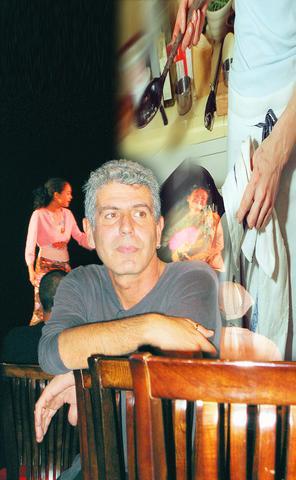American chef, writer, TV star and general bad boy of the kitchen, Anthony Bourdain was in town earlier this week on the Taiwan leg of what he described as a "a whirlwind, reckless careen through Asia and Australia."
Along with promoting the new season of his popular TV show, A Cook's Tour, the candid, towering 1.8m New Yorker was also here to lay groundwork and check out the possibilities for filming a Taiwan episode sometime in the, as yet, unspecified future.
"I'm spectacularly ignorant about Hong Kong, Mainland China and Taiwan," admitted Bourdain. "The trip is multi-purpose. It's a reconnaissance trip to see food, meet people and make notes so I'll be in a better position to say something reasonably intelligent when we return to make the show."

PHOTO: GAVIN PHIPPS, TAIPEI TIMES
The 22-part TV series, which begins its second season in November, follows Bourdain as he travels round the world to places such as Tokyo, Ho Chi Minh City, Phnom Penh and St. Petersburg in search of the "perfect meal."
Aired on the Knowledge Channel in Taiwan, the show, according to a spokesperson for Discovery Newtworks Asia, is one of the channel's top-10 rated programs.
The show has proven so popular, in fact, that Bourdain's book, A Cook's Tour: In Search of the Perfect Meal, originally published in 2001, is set to be translated into Chinese and published in Taiwan later this year.
Born in New York in 1956, Bourdain began his days as a dishwasher at a rundown diner in Provincetown, Massachusetts, 30 years ago. He graduated from the Culinary Institute of America in the 70s and has since spent his life in the kitchens of some of New York's grimiest and finest eateries.
Along the way Bourdain has built up a deep hatred of vegetarians, battled heroin addiction and worked as a head chef in some of New York's glitziest restaurants: All of which became the crux of his best selling book, Kitchen Confidential.
A popular figure he may have become, but Bourdain is more than happy to remain the bad boy of the kitchen by distinguishing himself from many of his peers with his no-nonsense, tell it like it is anti-hero chic.
While readily admitting that Keith Floyd is "cool," he spurns the moniker of "celebrity chef" with pride. The mere mention of celebrity chefs like Jamie Oliver leaves New York's most talked about line cook with a rather bad taste in his mouth.
"I'd rather be called a pyromaniac or a bed wetter. What kind of shit job description is `celebrity chef,'" Bourdain said in an interview with the Taipei Times. "`Professional wanker' I would wear with pride compared to the title of `celebrity chef.'"
Bourdain's visit may have been brief, but along with asking "What could be more frightening than walking into a McDonald's and looking at a Chicken McNugget? What the hell is a Chicken McNugget?" in an interview with CTI (
"I went to a market by the coast. Finding a local to take me to a neighborhood joint is always one of the first things I do when I get to an unfamiliar place. I want to know what people are eating and what people are selling," he said. "I knew I wasn't going to get to see the length and breadth of Taiwanese culture during this trip but what I have seen has been fantastic."
Even though this short sojourn didn't allow Bourdain enough time to wander through quite as many of Taipei's markets and visit as many of its restaurants as he would have liked, he did, in his own words "eat like a champion."
During his visit he munched his way through an "awesome" bowl of pig foot soup, "spellbinding" slow roast pork and some "really good" glutinous rice balls. And, thanks in part to large amounts of vodka and Taiwan Beer his inhibitions apropos singing in public places became a thing of the past after a rather heavy night out on the town last Friday.
"I got absolutely shit-faced drunk and ended up in a [KTV]. General policy on the show is nudity is OK, but karaoke is a no-no," he said. "I guess I've violated all of my principles now."
Hung over or not, Bourdain managed to relish the flavors and take pleasure in the exceptional quality of the food he was served at one of Taipei's most famous restaurants -- Din Tai Fung (鼎泰豐). He had nothing but high praise for the restaurant, especially when it came to the joint's "incredible" crab dumplings.
"On an item by item comparison basis a single crab dumpling there is a as good as anything any chef has made anywhere in the world. There's nothing better," Bourdain said. "It was a benchmark of food at its very, very best."

Growing up in a rural, religious community in western Canada, Kyle McCarthy loved hockey, but once he came out at 19, he quit, convinced being openly gay and an active player was untenable. So the 32-year-old says he is “very surprised” by the runaway success of Heated Rivalry, a Canadian-made series about the romance between two closeted gay players in a sport that has historically made gay men feel unwelcome. Ben Baby, the 43-year-old commissioner of the Toronto Gay Hockey Association (TGHA), calls the success of the show — which has catapulted its young lead actors to stardom -- “shocking,” and says

Inside an ordinary-looking townhouse on a narrow road in central Kaohsiung, Tsai A-li (蔡阿李) raised her three children alone for 15 years. As far as the children knew, their father was away working in the US. They were kept in the dark for as long as possible by their mother, for the truth was perhaps too sad and unjust for their young minds to bear. The family home of White Terror victim Ko Chi-hua (柯旗化) is now open to the public. Admission is free and it is just a short walk from the Kaohsiung train station. Walk two blocks south along Jhongshan

The 2018 nine-in-one local elections were a wild ride that no one saw coming. Entering that year, the Chinese Nationalist Party (KMT) was demoralized and in disarray — and fearing an existential crisis. By the end of the year, the party was riding high and swept most of the country in a landslide, including toppling the Democratic Progressive Party (DPP) in their Kaohsiung stronghold. Could something like that happen again on the DPP side in this year’s nine-in-one elections? The short answer is not exactly; the conditions were very specific. However, it does illustrate how swiftly every assumption early in an

Snoop Dogg arrived at Intuit Dome hours before tipoff, long before most fans filled the arena and even before some players. Dressed in a gray suit and black turtleneck, a diamond-encrusted Peacock pendant resting on his chest and purple Chuck Taylor sneakers with gold laces nodding to his lifelong Los Angeles Lakers allegiance, Snoop didn’t rush. He didn’t posture. He waited for his moment to shine as an NBA analyst alongside Reggie Miller and Terry Gannon for Peacock’s recent Golden State Warriors at Los Angeles Clippers broadcast during the second half. With an AP reporter trailing him through the arena for an